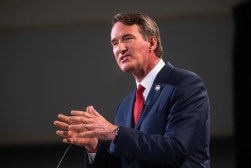Virginia to pay Northrop Grumman $35.8 million to end IT contract

The Virginia Information Technologies Agency and Northrop Grumman, its former statewide information technology contractor, settled a bitter lawsuit Friday, ending a years-long legal fight by the state to wriggle out of a long-term contract so it could reform its IT procurement policies.
Under the agreement, VITA will pay Northrop Grumman $35.8 million, roughly half of the $72 million the vendor claimed it was owed in August when the agency broke away from its 13-year contract 10 months early. The state is also required to pay $4.2 million in fees it had been withholding for mainframe service in connection with its lawsuit against the company. The state’s $2.4 billion contract, initiated in 2005, is now legally terminated, and the settlement concludes that “the parties shall have no further obligations whatsoever to each other.”
“The resolution brings closure to a long-running, costly, and burdensome dispute so VITA can focus on its primary mission: serving state agencies so they can serve the citizens and businesses of Virginia,” state Chief Information Officer Nelson Moe said in a press release. “We are pleased this dispute is behind us.”
The settlement came just as VITA implemented a multi-vendor IT model under which the state will acquire technology assets and services from a broad array of contractors rather than relying solely on Northrop.
The dispute goes back to 2015, when an independent audit recommended the state transition to a multi-vendor IT approach. When the state began pursuing such a model, officials claimed Northrop had become uncooperative, and accused the company of delaying upgrades and maintenance on core IT systems. Weeks after supposedly resolving its disputes with Northrop in July 2017, the company threatened to shut down an email service used by 56,000 state employees. Email service went uninterrupted, but the squabble continued.
Northrop sued the state for $10.2 million in damages in summer 2017, claiming VITA had failed to live up to some terms of its contract. The state quickly countersued for $300 million, claiming that the vendor had failed to upgrade systems and that the subsequent degradation had impaired service delivery and incurred costs to the government.
The state has now untangled itself from the original managed services contract with the defense contractor in favor of a multi-vendor model that will allow the state to negotiate smaller, more flexible contracts it manages itself. In an April interview with StateScoop, Moe said that while the state’s contract with Northrop allowed for annual reviews that theoretically allowed the state to upgrade its technology and adapt to industry trends, it only managed to exercise that option once in 13 years. Every other time, the state and its vendor failed to “negotiate mutually beneficial terms,” Moe said.
The multi-vendor IT model officially went live on Monday in Virginia, but in practice, the state’s IT office has been separated from Northrop for months. Though the state’s contract with Northrop had not been terminated legally, a services integrator, Science Applications International Corp., took over management of the state’s IT in August until the multi-vendor model was officially implemented.
Over the past few month, the state has announced contracts for services that are now being integrated by SAIC, which will become the state’s permanent services integrator in March. The state’s agreements now include contracts totaling hundreds of millions of dollars with:
- Atos – Managed security
- Iron Bow – End-user services
- Perspecta – Mainframe
- Tempus Nova – Messaging
- Unisys – Server/storage/data center
- Verizon – Data/voice network
- Xerox – Print services
Moe said the new arrangement will allow the state to “keep up with the rapidly changing pace of technology and create a more agile, transparent and adaptable enterprise infrastructure.” The new arrangement is more in keeping with state government’s common practice, but Moe said the state is unique for the scope and complexity of the technologies reached by its vendors.
In a statement, Northrop Grumman’s vice president of strategic communications, Tim Paynter, noted the end of the lawsuit and praised the company’s work for Virginia. “Northrop Grumman is pleased to have resolved its legal dispute with VITA and the Commonwealth of Virginia and we are proud of our award-winning work on behalf of the Commonwealth and its citizens over the past 13 years,” he said.





